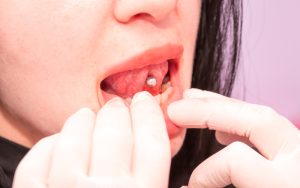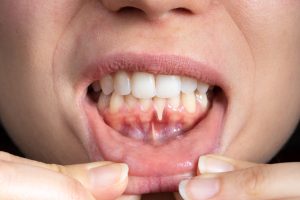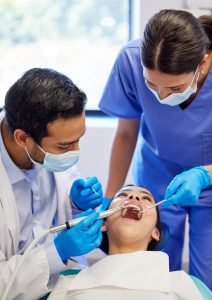How Do Oral Piercings Potentially Put Your Oral Health at Risk?

At The Dental Care Group, home of the best dentist in Aventura, FL, we believe in empowering our patients with knowledge. Today, we’re diving deep into the risks oral piercings can pose to teeth and gums, and how Dr. Rick Mars can help you maintain a healthy smile. Be sure to call our Aventura dental office at 305-935-2797, Pembroke Pines at 954-430-2300, or Fort Lauderdale at 954-963-3706 if you suspect an oral piercing has compromised your dental health.
The Hidden Dangers: How Oral Piercings Can Harm Your Smile
Many people focus on the initial pain and healing process of an oral piercing, but the long-term impact on your teeth often goes overlooked. Unlike earrings or other body piercings, oral piercings are constantly in an environment filled with bacteria, and they are in direct contact with your teeth and gums during everyday activities like talking, eating, and even sleeping.
1. Chipped and Fractured Teeth: A Common Casualty
One of the most frequently observed problems with oral piercings is damage to tooth enamel. The metal or other material of the piercing can repeatedly bang against your teeth, leading to chips, cracks, and even full fractures. Imagine the impact of a metal tongue ring hitting a tooth every time you speak or chew. This seemingly small impact, over time, can cause significant damage.
At The Dental Care Group, we’ve seen various degrees of tooth damage directly attributable to oral piercings. A chipped tooth might seem minor, but it can expose the sensitive inner layers of your tooth, leading to pain and increased risk of decay. A fractured tooth, on the other hand, can be much more severe, potentially requiring a root canal or even extraction. If you’ve experienced any tooth pain or chipping and have an oral piercing, we encourage you to call The Dental Care Group for an assessment with Dr. Rick Mars.
2. Gum Recession: Exposing Your Roots

When your gums recede, your teeth can appear longer, and you might experience increased sensitivity to hot and cold temperatures. Beyond aesthetics and discomfort, gum recession can lead to more serious periodontal issues if left unaddressed. Regular check-ups at The Dental Care Group are vital for detecting and managing gum recession early on. Dr. Rick Mars and our team in South Florida are dedicated to preserving your gum health.
3. Infection: A Constant Threat
Your mouth is home to millions of bacteria, and introducing a foreign object like a piercing creates a new pathway for these bacteria to enter your bloodstream. Oral piercings are particularly vulnerable to infection, both during the initial healing phase and throughout their lifespan. Poor oral hygiene, a compromised immune system, or even minor trauma to the piercing can lead to painful and potentially serious infections.
Signs of infection can include swelling, redness, pus, fever, and difficulty speaking or swallowing. If you suspect an infection related to your oral piercing, it’s crucial to seek medical attention immediately. While The Dental Care Group primarily focuses on dental health, we can advise on the oral implications of such infections and help you find appropriate medical care. Your well-being is our priority at The Dental Care Group.
4. Nerve Damage and Speech Impediments
While less common, oral piercings can also lead to nerve damage, especially with tongue piercings. The tongue is a highly innervated organ, and a misplaced piercing can impact nerve function, leading to numbness, altered taste, or even permanent nerve damage. Additionally, a foreign object in your mouth can sometimes interfere with speech, causing a lisp or difficulty articulating certain sounds.
5. Allergic Reactions and Scarring
Some individuals may experience allergic reactions to the metals used in oral jewelry, leading to irritation, swelling, and discomfort. Even if you don’t have an allergy, prolonged irritation can lead to the formation of scar tissue around the piercing site, which can be unsightly and sometimes interfere with oral function.
Protecting Your Smile with an Oral Piercing: What You Can Do

- Choose a Reputable Piercer: If you get an oral piercing, select a licensed and reputable piercer who adheres to strict sterilization protocols.
- Prioritize Oral Hygiene: Maintain impeccable oral hygiene. Brush your teeth at least twice a day, floss daily, and use an antimicrobial mouthwash. This is even more crucial with an oral piercing.
- Regular Dental Check-ups: Regular visits to The Dental Care Group are essential. Dr. Rick Mars can monitor the condition of your teeth and gums, identify any potential issues early, and provide guidance on maintaining your oral health with an oral piercing. Schedule your next appointment by calling The Dental Care Group.
- Be Mindful of Habits: Avoid playing with your piercing with your tongue or teeth, as this can increase the risk of damage.
- Consider Removal: The safest option for oral health is to remove oral piercings. If you’re experiencing pain, discomfort, or notice any of the issues discussed above, removing the piercing is highly recommended. Dr. Rick Mars can discuss the benefits of removal for your long-term oral health during your visit to our dental office.
Your Oral Health Partner in Aventura, FL
At The Dental Care Group, our commitment is to your overall oral health and well-being. While oral piercings may offer a unique aesthetic, understanding their potential impact on your teeth and gums is paramount. We encourage open discussions about your oral health choices.
Dr. Rick Mars and the compassionate team at The Dental Care Group are here to provide comprehensive care and personalized advice. We’re conveniently located in multiple locations throughout South Florida and ready to answer your questions. Contact us today at our dental office in Aventura at 305-935-2797, our dental office in Pembroke Pines at 954-430-2300, or our dental office in Fort Lauderdale at 954-963-3706 to schedule your consultation.

